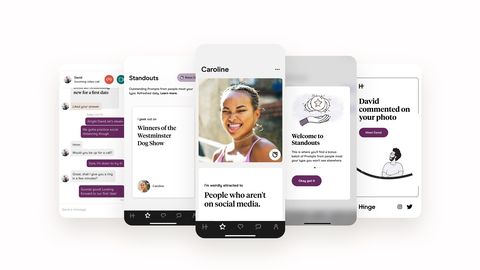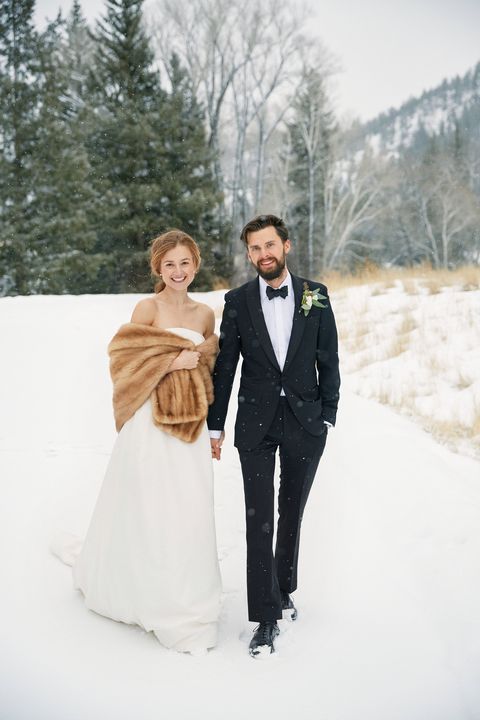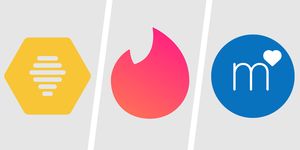When Justin McLeod launched the dating app Hinge in 2012—the same year Tinder was founded—there was still a stigma around meeting partners online. It seemed dangerous, or it meant you were desperate. But as more young people got onboard with swiping for love, that stigma gradually dissipated; now, Hinge and its peers are as embedded in the fabric of modern love as pulling a Netflix and chill.
Of course, as of 2020, dating apps weren’t just ubiquitous—they were the only way to meet new partners, aside from batting your eyelashes seductively to another socially-distanced stranger in the park. Video dates rose in popularity (because who wants to venture outside in a pandemic for someone you’re not that into?) and singles were quicker to commit to new partners.
“I think people have become a lot more intentional about their dating lives,” McLeod says. “I know there are some articles out there saying this is going to be the summer of hedonism, but actually what I think happens is when people are confronted with a lot of uncertainty and some of the hard realities of our human existence, they realize we don’t live forever. Ultimately, I think a lot of people want to find their person, and there’s really no time like the present.”
That’s good news for the founder and CEO, whose mission with Hinge has always been to help people find long-term love, and not swipe until their thumbs fall off. (It’s the reason the company bills itself as “the app designed to be deleted.”)
In this installment of 20 Questions, we talked to McLeod about his best tips for finding a lasting relationship on Hinge, his own truly epic love story, and the dating app trend he wants to see die (warning: it might something you’ve done before, Men’s Health readers).
1) It used to be that all my single friends were on Bumble or Tinder. Then, a few years ago, everyone was suddenly using Hinge as their default dating app. How did you do that?
We call ourselves the dating app designed to be deleted, and that’s because we really focus on effectiveness. We’re the only dating app still that asks users whether they’re going on dates and whether they’re great, and that relentless focus on effectiveness versus engagement, retention and gamification, I think over time, it’s just led to a reputation. That is the app that really works when you’re looking to get off dating apps and find your person.
2) What do you say to couples who are still embarrassed to say they met on a dating app?
In our branding and marketing that we do, we want people to be very proud of the fact that they met on it. We want it to be the way that you want to say that you met, because it’s for people who are being thoughtful and making great decisions. And I do think that just given that the majority of people use dating apps today, and the majority of relationships that start from the dating apps and online dating, at this point, I really think that people who are embarrassed are becoming fewer and farther between. There’s absolutely no reason to be.

3) What’s your best piece of advice for sending a first message to a match?
This really gets to the core of what makes Hinge different, is that you don’t just like someone and match; you actually begin a conversation with them by liking one of their photos or prompts, and ideally adding a comment as well. And so I think there is no perfect generic opener where everyone would use it—it would no longer be a good opener. What’s truly a good opener is to say something that’s contextual and specific about what you notice about the person that you’re interested in.
4) What’s your best piece of advice for choosing a profile photo?
We have ‘What Works’ guides that guide people toward which photos to pick and how to answer prompts well, and one of the most important things that we found is just having a variety of photos—[not] your face six times in a row—is really, really helpful for someone to get a sense of your personality and who you are, and also give people more of an ability to start a conversation with you. It’s more likely that you might be doing something or traveling somewhere that would catch the other person’s attention, or have identified some point of commonality.
5) What’s a trend in dating profiles—à la the tiger selfies of 2017—you’d like to see disappear?
If you look at the ‘What Works’ guides on the Hinge app, we also have a very clear sense of what doesn’t work. What typically doesn’t work are like, filters and outdated shots and mirror selfies. I think the worst-performing photos that we see are gym selfies.

6) I read that you built this app to help you find love after the woman of your dreams (who’s now your wife) got away. That’s a pretty productive response to heartbreak! Why not get on one of the existing dating sites, like OkCupid? Why create your own?
This was 2011, so a different era. OkCupid, they just had a certain stigma to them. That’s because they were complicated; you had to go through a long sign-up process and you had to pay money. And it just meant that in order to do that, you really had to admit to yourself and others that you were really struggling in your dating life, because otherwise you wouldn’t go through all that trouble and pay all that much.
I think the big innovation that made the apps so accessible to everyone is a one-click sign-on, [and] the linking to your social networks. It became so easy that people were just like, ‘Well, why wouldn’t you do it?’ That’s what changed and what Hinge helped introduce. I had trouble meeting people in real life because I had stopped drinking and doing drugs … and I felt like it would be different, at the time, if it were a friends-of-friends experience, connected to Facebook.
7) Your wife was due to get married in a month when you flew to Switzerland and told her you wanted to be with her. Within three days, she’d left her fiancé. Can you give us an idea of what happened in those three days, and what you learned from the experience?
There was quite a history there between the two of us. I think both of us had actually romanticized our college relationship; it was a first love relationship. I think we both thought about each other a lot over all those years. And then when we came back together after eight years, I think that all those memories and feelings flooded back, and we were sort of in this honeymoon high making this decision—which ultimately turned out to be an amazing decision, don’t get me wrong. But I think when we actually started living together, that’s when the real relationship began and where the real love began.
What I learned from the overall experience is the idea that you don’t find the one; you create the one. A lot of people approach their dating lives as, if they keep going through enough people, eventually they’ll find the perfect person and everything’s easy from there. And it’s really like, you create that experience of feeling like you’re the one by how you show up in your relationship and clearly communicate and be vulnerable and create a sense of intimacy and dedication and loyalty.
8) So, wait… Did you give her any advance warning that you were flying to Switzerland, or did she not realize until you were there?
She did not realize until I got there.
9) What was the moment like when she saw you there?
What had happened was we hadn’t talked for quite a while, and I reached out to her, like, sort of ‘one last time.’ I really didn’t think she was going to respond because she never responded—I’d, like, write her once a year on her birthday. And I was headed over to London, where I thought she still lived, for a Hinge launch party. And I was just like, Okay, I’m going to shoot one last email. And I just said, ‘Hey, going to be in London, would love 15 minutes. It’s weird to think I’m never going to see you again. I’d love to just to say hi and goodbye.’ She wrote back the next day, and she’s like, ‘Hey, you know, I’m not in London anymore. I’m in Switzerland. My fiancé’s obviously not a huge fan of yours, but I’m happy to chat with you on the phone.’ I said, ‘Okay.’ And then I went to the airport. She called me the next morning, and she was like, ‘Uh, hey, you know, I’m awake. I’m six hours ahead of you, so whenever you’re awake, I’m into the chat.’ And I was like, ‘Well, great, because I’m going through immigration right now.’
We met up in this café and I thought, God, like, it had been eight years, I’ve changed so much. I’m sure she changed a lot as well. And so I really thought that walking into this, we’d maybe laugh it off and I would get some closure. I didn’t think we’d have this really electric connection the moment we sat down. It wasn’t even after three days [that we decided to be together]; it was at the end of that café visit that she was like, ‘I think I have to call off the wedding.’
10) So the next three days were figuring out how to proceed?
Yeah. I think we were sort of realizing the scope of what this is going to mean for her and for me if she really did this. Then we [spent] the weekend touring around the city, just kind of hanging out. Then I left and I went to London, had a launch party, and then she met me back in the States. I mean, it’s obviously more complicated than that, but that’s what happened.

11) How do your experiences with substance abuse and recovery shape how you run Hinge?
Well, I think the biggest one is I’m just so conscious about digital addiction. I really believe [our devices] can be addictive. They’re designed to be addictive. They can activate the same pathways in our brains, and they’re always accessible in our back pocket. Part of Hinge’s ‘designed to be deleted’ mission is that we do not optimize for engagement and retention and time on app—all of these things that a lot of other apps, especially social media apps in general, will optimize for. It’s a moral decision, and it really defines the organization.
12) Dating apps have obviously improved dating culture in many ways. But are there any ways you would admit it’s made dating worse?
People used to make dating decisions based on … fear that I’m never gonna find anyone. [Now it’s] ‘Oh my gosh, I haven’t found the most perfect person yet’ because it has this sense of endless choice. But that feeling endless choices is really an illusion. And I think people start to realize that over time. It gets back to what I was saying before about finding the one versus creating the one.
13) Harassment and stalking can be an issue with dating apps. How do you combat that issue?
We have a ‘We Met’ survey where we ask our users after they exchange phone numbers … if you went out on a date and if it was good. If it wasn’t good, we always ask for a report, because we want to know, obviously, not just on the platform, but if there’s anything that happens off the platform, we want to be able to take action. And we have a huge moderation team and data scientists that are constantly ensuring that the Hinge platform remains free of any kind of behavior like what you’re referencing. It’s a top priority for us.
14) What’s the biggest change you think we’ll see in people’s dating habits post-pandemic?
The adoption of the video chat first date. It makes a ton of sense. If you’re interviewing for position at a company, you usually do a quick phone screen before they bring you in for a full slate of interviews. And I think it’s very similar in dating. It can be really discouraging and cause a lot of burnout when you walk in and two seconds later you realize, Ah, this is not the person that I thought this was. This is not where I want to be.
15) What’s your best first date experience?
Before I got back together with Kate, one of the best dates that I went on is when I actually did the New York Times‘ 36 Questions That Lead to Love. Being vulnerable with the other person off the bat was a really cool experience to go through with someone.
16) What’s the worst date you’ve ever been on?
Back in my more foolish days, when I’d just moved to New York and I was out there dating, I had a date scheduled with someone on a night, and then there was another person that I been talking to, and the only night she could do was the same night. I tried to schedule two dates in a night, one after the other. And when I went out with the first person, I got seated at a table next to the person I was supposed to meet later.
17) Did you see her?!?!
I didn’t even realize it. Then I called the second person and we actually met up. She was with some friends, and she was just like, not talking to me basically the whole time. We walked home together and it was kind of this weird thing, like, Are we going to go get drinks somewhere? What are we gonna do? She just turned to me and was like, “Did you or did you not see that I was seated next to you the whole time you were at dinner tonight?” I was like, “Oh my gosh. I’m so sorry.”
18) How does it feel when you find out that a couple who met on Hinge is getting married?
It’s always amazing. It’s really nice to be able to put a face to and see the outcome of all the work that we do day to day. We’re setting up to date every two seconds now. A lot of people write in with their success stories, and we also see [Hinge] in places like New York Times wedding section. I think it’s like significantly the most-mentioned app among any other dating apps there.
19) What’s the single most challenging thing about your job?
When the pandemic started, we were about 50 employees. We just cleared 100 employees, and we’ll be probably 150 by the time we come back together [around] Labor Day. So trying to scale a team and a culture that’s triple the size while remote is just really challenging. I think we’ve had an incredible team and we’ve done it very well, but it has taken a lot of work and craft and resilience.
20) What’s the most rewarding thing about your job?
Being able to see all these couples out in the world: hundreds of thousands—if not coming up on millions—of couples that we’ve created. That’s incredible.
Source: Read Full Article


